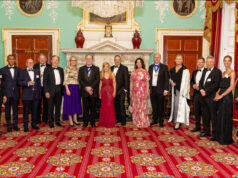
Dr Wilmot James MP, DA Shadow Minister of Trade and Industry, delivered the following speech at the House of Commons in London on 28 June:
Good evening Ladies and Gentlemen,
It brings me great pleasure to be here today to engage in what I believe will be a fruitful discussion about the important role that trade plays in stimulating economic growth as well as the challenges and opportunities facing South Africa as the ‘gateway to Africa’ and as the latest member of the BRICS group of countries, which together are expected to account for 40% of global growth, according to IMF statistics.
I currently head up the headline economic policy initiative of the Democratic Alliance, which we have codenamed the 8% Growth Project. The project aims to unlock South Africa’s true growth potential and match the impressive economic performance we are seeing in other middle income countries such as Malaysia and Turkey by adopting bold policy reforms.
Putting South Africa on a high-growth path is critical if it is to adequately address the very serious social problems inherited from the apartheid era. No country has successfully addressed such issues on a sustained basis in the absence of strong economic growth.
A central component of the party’s growth plan has to do with consolidating and enhancing South Africa’s role as the preeminent trade and investment destination on the African continent by:
Making key investments in infrastructure and cutting red tape to enhance the country’s competitiveness;
Expanding our trade profile to better engage with emerging powers in the Global East and South, particularly in Africa; and
Deepening and strengthening our relationships with established trade partners such as the UK.
It is certainly an exciting time to be in Africa. According to a recent report by the management consultants McKinsey and Company, entitled Lions on the Move, the continent’s collective GDP is set to grow from $1.6 trillion (roughly the same as Brazil or Russia) to $2.6 trillion by 2020 (larger than the UK and slightly smaller than that of France).
Taken as a unit, Africa will be a force to be reckoned with in coming decades.
Both as a location to invest and as a market, the continent is alive with opportunities. The same report noted, for example, that Africa is currently home to 60% of the world’s uncultivated arable land, and will feature 1.1 billion people of working age in 2040. That works out to more working-age people than China has today.
By the end of this decade, Africa will have 128 million households with notable discretionary incomes to spend on consumer products. The amount they will spend on such products is estimated to grow from over $860 billion today to $1.4 trillion by 2020.
As the single largest economy on the continent, South Africa is well positioned to capitalise on these trends and provide a conduit for international investors eager to do business with Africa.
Our principal trading partner is the European Union, and the Democratic Alliance – as a national ‘government in waiting’ – is committed to strengthening and deepening this relationship even as we look to expand our horizons through networks such as the BRICS group and the IBSA (India-Brazil-South Africa) forum.
Taken together as a group, the EU countries (the most significant trading partners among them being Germany, France and the UK) account for 27.4% of South Africa’s exports, the total value of which was US $94.2 billion.
Annual bilateral trade between South Africa and the UK is estimated to be worth GBP9.6 billion, according to the British Trade and Investment Department. As a single entity, the EU is followed closely by China (13.4%), our second largest trading partner, and the United States (10%), which is third.
Naturally, given our country’s rich mineral resources, the bulk of South Africa’s exports to the EU comprises fuels and mineral products, followed by machinery and transport equipment, and other semi-manufactured goods.
On the other hand, the EU exported 25.6 billion euros worth of goods to South Africa in 2011, and 6.4 billion euros in services. Exports to South Africa were concentrated in high-value sectors such as machinery and transport, which accounted for 50% of goods received, as well as chemicals and partially-assembled machinery.
While these numbers may seem impressive, South Africa is in fact facing tough competition from our neighbours on the continent, many of which are showing signs of strong growth, albeit from a much lower base.
Both Lagos and Nairobi, for example, are becoming important financial centres in their own right.
Luanda and Kinshasa are also attracting considerable amounts of capital, particularly from investors interested in minerals extraction industries. Some new investors are choosing to locate their operations in these rapidly growing cities, rather than in the continent’s established hub: Johannesburg.
It should be noted though that none comes close to matching the scale, sophistication and infrastructure of the South African economy. Johannesburg is home to the 16th largest stock exchange in the world (the largest in Africa) and is the world’s largest ‘dry port’. The vast majority of corporations in the sub-continent are headquartered in South Africa.
Still, for the shipping industry in particular, the competition posed by the emerging African lions provides clues as to what South Africa needs to do to stay ahead of the game and ensure that our key harbours such as Cape Town, Port Elizabeth and Durban remain the first ‘port of call’ for businesses wishing to import and exports goods from the African continent.
Mauritius is an excellent example. According to the World Bank’s Doing Business report, the island nation is giving its big brother down south a run for its money on several indices measuring the ease of conducting cross-border trade.
By implementing bold reforms and making smart investments in infrastructure, Mauritius has climbed the Doing Business rankings to register 23rd in world for ease of doing business in 2012, a small dip from 21st last year, but still far ahead of other African countries. Notably it retained its 21st spot on ‘Trading Across Borders’, an area where South Africa lags behind.
These few indicators give an idea of where we need to improve:
In South Africa it takes on average 30 days and 8 separate documents to export a typical container load of goods at a cost of $1500 per container. In Mauritius, the same container could be exported in half the time, involve only 5 documents, and at a significantly reduced cost.
In South Africa it takes on average 35 days to import a container load of goods with 9 separate documents, whereas the same process in Mauritius would take 13 days and involve only six documents.
As a consequence of inefficiencies such as these, South Africa ranks very low – 144 out of 148 countries surveyed – for ‘Trading Across Borders’, despite the volume of trade, which dwarfs our neighbours, and the strength of the economy as a whole.
It is clear that bold reforms are needed in order to cut red tape, upgrade our port infrastructure and streamline our import and export processes if South Africa is to remain the ‘Gateway to Africa’ in the coming decades.
There are also aspects of South Africa’s tariff regime that remain uncompetitive, despite the country committing to rationalising its tariff lines as per the Uruguay Round of the General Agreement on Tariffs and Trade (GATT). The clothing and textiles industries remain highly protected relative to other sectors of the economy, while duties placed on certain specified products (such as automobiles) can be very high.
From the perspective of the Democratic Alliance there are two key channels open to us to influence national policy:
By providing a ‘best practice’ example where we govern in the Western Cape Province; and
By offering South Africa a better set of policy alternatives as a national ‘government in waiting’.
Although provincial governments do not control South Africa’s ports or customs authorities, there is much the Western Cape Government is doing to enhance trade relations along the south-western coast of Africa.
The DA’s provincial minister for Economic Development, for example, recently led a national trade delegation to Angola to discuss possible investment opportunities for South African firms there, and, together with the provincial transport and public works minister, has played an important role in promoting the ports of Cape Town and Saldanha Bay as key sites for the oil and gas industry.
At a national level, the DA has developed a comprehensive set of policy alternatives designed to enhance South Africa’s position as the continent’s preeminent trade and investment hub. These will be lobbied for in the country’s national Parliament, and will form an essential part of our economic policy manifesto for the 2014 national elections.
Examples of these policies include:
One-stop border posts to expedite the border crossing process;
simplified import and export procedures to significantly reduce the time and costs involved in trading across borders;
simplified customs procedures;
an increase in infrastructure spending to 10% of GDP, including major upgrades to rail and port facilities; and
upgrades to the country’s information and communications technology (ICT) infrastructure to lower the cost and enhance the competitiveness of doing business in South Africa.
I look forward to hearing your questions and comments regarding this important topic, and hope that this event will provide the starting point for a sustained engagement regarding the issues affecting trade with Africa, and South Africa in particular.
By DA Abroad









